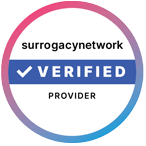Taking care of yourself after giving birth can feel like an impossible task. You need to take it easy, but take care of your family. You need to rest, but need to have some socialization, too. You need to visit IPs before they leave, but are supposed to stay in bed. You need to sleep, but pump breastmilk. There are a ton of dichotomies when it comes to postpartum recovery, especially for a surrogate. As a three-time surrogate and postpartum doula, I wanted to share four steps to help you recover in the best way possible.
Preparation
One of the most important things you can do is prepare for postpartum recovery. There’s a reason the phrase ‘it takes a village’ still resonates with women today. Having a network of people to help support you after the birth is really important. This could be friends, family, or a postpartum doula. Having them around to help with household tasks, chores, childcare, entertaining your children, and meal-prepping and cooking for you is absolutely priceless. Knowing all this in advance you can work some of these things into your surrogacy contract. For example, you can have postpartum doula care written into the contract, as well as extra childcare, cleaning services, meal delivery services, etc. Putting extra thought into how your postpartum recovery is going to go, is one of the most important things you can do for successful, postpartum recovery, whether that’s for a vaginal or cesarean birth.
Physical
For physical recovery, the saying is five days in bed, five days on bed, five days around bed. It is so important to give yourself the full three to four weeks for vaginal and six weeks for cesarean birth to recover. This can be difficult when you start to feel better after a couple of weeks. However, the more you can do nothing upfront, the quicker you’ll heal long-term. The other part of physical recovery that’s really important is physical touch. We tend to isolate women who give birth, especially when you’re resting in bed by yourself all day. The problem is, it’s really important that as a newly postpartum person, you are getting massages and touched on a regular basis. These can be sweet little ones from your children and your partner, or from professional massage therapist (some even do home visits). It doesn’t matter who, just that you are getting daily and weekly physical touch. This helps release oxytocin, increase blood flow and lymph drainage, and support emotional recovery as well as physical recovery.
Nutrition
For nutritional health, you want to think about warm, nutritious, nourishing meals. Lots of ginger, herbal teas, soups and broths are going to be the most supportive for recovery whether it’s winter or summer. In Eastern medicine, the belief is we lose a lot of blood and heat, when we give birth. So we need to put all that warmth back into our bodies. There’s a fantastic book called The First 40 Days that covers a lot of what I’ve talked about already, plus has recipes as well. Really focusing on nutrient-dense foods with little sugar gives your body the minerals and nutrition it needs to fully recover. Eating lots of spinach and high protein is really supportive while you’re bleeding. Always continue to take your prenatal vitamins and any other supplements you were taking for birth after birth.
Emotional
Emotional recovery is talked about the least, but it’s so important. As a surrogate, we give birth and then obviously we are not around the baby much or sometimes at all. This can create some emotional lows, especially around days three and four, that can be hard to navigate if you’re not prepared for them. It has nothing to do with the mental awareness that the baby is not ours. It is a bio-feedback that our body is missing something. It can feel like an emptiness or a hole inside, or like something is missing. It can feel like a kind of like seasonal or post-big event depression. To help with this first identify that feeling with grace and know it’s normal. Have quality time with your family and think about all the wonderful things you will get to do now that you are not pregnant. During your recovery, it also helps to watch and read things that make you laugh. If possible, spend some extra time with your intended parents and the baby during those first couple of days, even if it is just pictures. This will really help with that oxytocin release. Physical touch will also help a lot with this as well. Lastly, don’t be afraid to ask for help, whether that’s a friend, partner, or medical professional.
Being a surrogate is such a selfless act, and you give not only your time and energy but your body as well. The postpartum time is when you get to be really thoughtful for yourself and ask for what you want and need. This is the time to take care and spoil yourself as much as possible. So, schedule that massage, order your favorite meals, rent that new movie, and spend some good quality time with the people you love.





